Major historical events are always analyzed under a magnifying glass. People ponder why they ended as they did and if anything should have been done differently. If you look close enough, you will see that even the most impactful moments in history were changed or, at least, influenced by tiny, seemingly insignificant events.
Of course, we cannot know for certain that the outcomes would have been different if these small incidents did not occur, but their effect seems substantial enough to make us wonder, “What if?”
10. A Booty Call Ends Scotland’s Golden Age
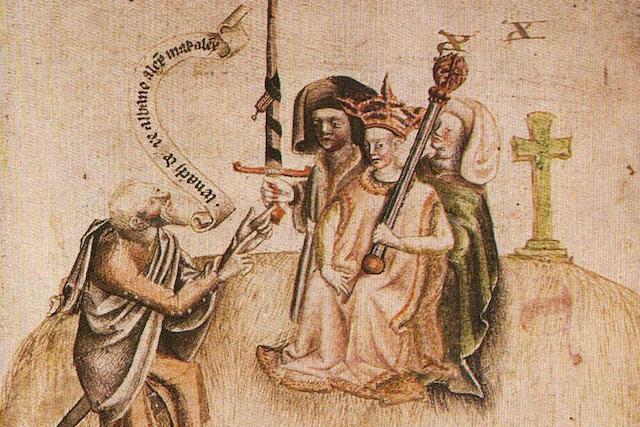
King Alexander III is regarded as one of the greatest Scottish rulers in history. In 1266, he regained the Isle of Man and the Western Isles from Norway following the Treaty of Perth and Scotland experienced a prosperous golden age. He had one big flaw, though, as Alexander was a massive horndog. As the contemporary Lanercost Chronicle said, the king “used never to forbear on account of season nor storm, nor for perils of flood or rocky cliffs, but would visit none too creditably nuns or matrons, virgins or widows as the fancy seized him, sometimes in disguise.” In other words, nothing would stop Alexander when he was looking for a booty call.
On March 19, 1286, the king’s libido proved fatal. He had spent the entire day with his advisers in Edinburgh and had decided that he would visit his young, new wife that night, Queen Yolande de Dreux, who lived in the town of Kinghorn, just across the water. However, there was a massive storm outside, so his councilors all pleaded with Alexander to wait until morning.
Nothing doing, though. The king braved the elements in order to meet with his bride. He made it across the water on a ferry and set off on horseback into the dark night, accompanied by only a few servants. Unsurprisingly, the riders got lost in the blackness and then got separated. The king’s lifeless body was found the next day, having been thrown by his horse off a cliff after riding too close to the edge.
All of Alexander’s children already died before him and his heir was his three-year-old granddaughter, Margaret. However, a lot of the nobles weren’t keen on the idea of a girl infant becoming the new monarch of Scotland, so this triggered a succession crisis which brought an end to Scotland’s short-lived golden age.
9. A Vague Prophecy Ends One Empire and Creates Another

Croesus was an ancient king who ruled over the Kingdom of Lydia and was renowned for his unfathomable wealth. He was also a firm believer in the prophecies of oracles, and after making numerous offerings at several locations, Croesus had concluded that the most trustworthy and accurate diviner was the famed Oracle at Delphi.
During the mid-6th century BC, Croesus couldn’t help but notice the rise of Cyrus the Great, the king of a relatively small city named Anshan who, nevertheless, managed to conquer the much more powerful Kingdom of Media. Wanting to know how he should handle this upstart, Croesus asked the oracle what would happen if he went to war against Cyrus. The oracle replied that “if Croesus goes to war he will destroy a great empire.”
Now, we all know that prophecies are generally vague so people can interpret them as they want. But in the mind of the king, this could only mean one thing – a triumphant victory for Lydia. So Croesus went to war against Cyrus but, as it turned out, the “great empire” he destroyed was his own. Cyrus won the war, conquered Lydia, and went on to conquer Babylon, as well as other nations, thus founding the Achaemenid Empire.
8. An Ill-Fated Voyage Dooms the Metric System in America
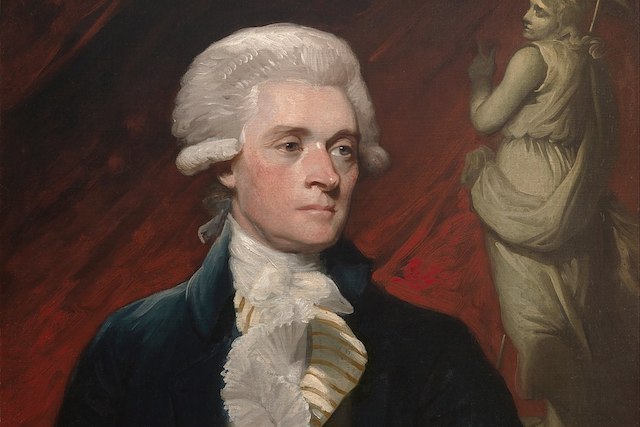
America has a contentious relationship with the metric system, despite the best efforts of Thomas Jefferson. Unsurprisingly, when the United States had emerged as an independent country, many officials were eager to get rid of the old British units of measurement. Jefferson, Secretary of State at the time, was a big fan of the metric system; it was new, efficient, and innovative. But not everyone was sold on it, so Jefferson sought assistance from France and, in turn, they agreed to send scientist Joseph Dombey to the United States to help implement the metric system in the country.
Unfortunately, he never arrived. In 1794, Thomas Jefferson received word that Dombey’s ship had been blown off-course by a storm and was then captured by British privateers. The scientist tried to disguise himself as a Spanish sailor, but the fact that he had a French accent and barely spoke any Spanish gave him away. The pirates took Dombey hostage and imprisoned him on the island of Montserrat. They intended to ransom him, but the scientist died in captivity before the French government had a chance to pay, and America ultimately stuck with the old measurement system.
7. An Art School Rejection Creates the 20th Century’s Greatest Villain

In 1907, the Academy of Fine Arts Vienna denied admission to an applicant, criticizing his works for having precision, but lacking any feeling or imagination. He applied again the following year, but with the same result. This rejection placed this 18-year-old student on a completely different path, one which had dire consequences for the entire world, as the applicant was none other than Adolf Hitler.
Later, while writing Mein Kampf, Hitler admitted that his initial goal in life was to become an artist. When the art school rejected him, he was left living in squalor on the streets of Vienna, reduced to making kitsch paintings that he sold to tourists and frame sellers to make ends meet. Historians are pretty certain that it was during this time that Hitler was exposed to heavy anti-semitic rhetoric, as the poor classes were being repeatedly told to blame their woes on the Jewish elite who were hoarding all the wealth.
With his art career dead and buried, Hitler enlisted in the German military, and later entered politics. And the rest is a very bloody and tragic history.
6. A Shoddy Press Conference Brings Down the Berlin Wall
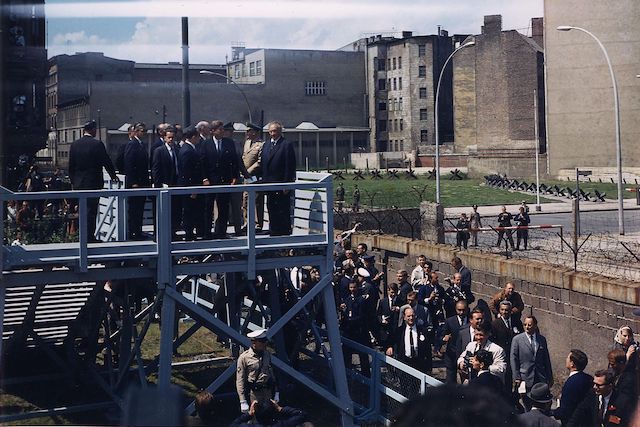
November 9, 1989, was supposed to be just another day for East German communist official Günther Schabowski. Little did he know that a few words he would say without a second thought would bring down the Berlin Wall and change the course of history.
Schabowski was a spokesman for the Communist Party, whose job was to deliver a daily press conference with news from the party. But on that particular day, Schabowski was tired and ill-prepared, maybe a little hungover, and just skimmed through the memo he was supposed to present. Later, he announced on live radio and television that East Germans were now allowed to leave the country through any border crossings, causing the journalists in the room to collectively raise their eyebrows.
What Schabowski actually meant was that starting with the following day, East Germans would be able to apply for visas in an orderly manner and, after a few weeks of red tape, one or two of them might be allowed to leave. It was intended as a meaningless platitude designed to make the party look good, but when one of the reporters asked Schabowski when the changes would take effect, the unprepared spokesman mumbled for a bit, looked at his papers confused, shrugged, and said “Ab sofort” – from now on.
Within hours, tens of thousands of citizens gathered at the Berlin Wall, looking to enter West Germany. The guards tried in vain to stem the tide of humanity but eventually relented and opened the border. Germans on both sides began chipping away at the wall and it was officially demolished in June 1990.
5. A Mistranslated Word Leads to War
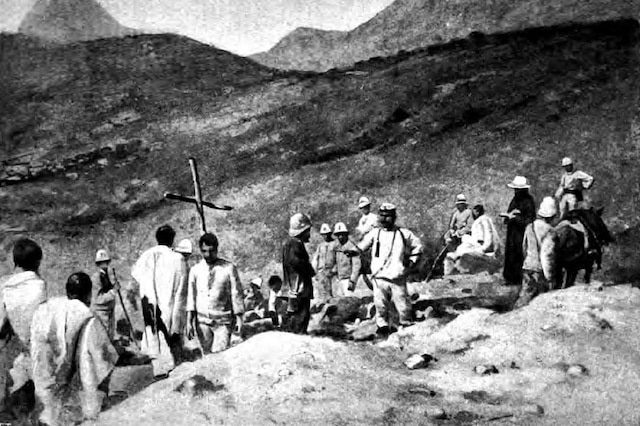
Language can be a tricky thing, especially when you have to convey the exact same message in two or more different languages. Just one mistranslated word could change the meaning of the text entirely which, in turn, could lead to disagreements, misunderstandings, or, in this case, even war.
On May 2, 1889, Italy and Ethiopia signed the Treaty of Wuchale. It was meant to signify a peaceful and prosperous relationship between the two nations, but it did the exact opposite. The pact was written in two languages: Italian and Amharic, an Ethiopian Semitic language. In the Amharic version, one of the twenty articles said the Ethiopian emperor could enlist the help of the Italian government to discuss matters with other European powers. The word “could” here is very important because the Italian version said that the emperor “must” use their government, in essence, recognizing Italy’s authority over Ethiopia.
Some say this was a simple translation mistake because the same word formed a permissive clause in Amharic and a mandatory clause in Italian. Others claimed it was a planned deception. Either way, Italy decided to make the most of it and declared Ethiopia a protectorate. Of course, Ethiopia rejected the treaty, which led to war in 1895. Surprisingly, Ethiopia won the war in 1896, following the Battle of Adowa (also spelled Adwa), and its independence was recognized by all world powers, marking a landmark moment for the Pan-Africanism movement that fought to resist the new imperialism of the Western nations.
4. A Lost Dispatch Helps the Union Win the War

In 1862, the American Civil War was going pretty well for the Confederacy. Not only did it garner several important military victories, but both France and Britain were on the verge of recognizing it as a separate nation. One more big win could have decided the war in favor of the Confederacy so, with that in mind, General Robert E. Lee launched the Maryland Campaign in September, invading the North for the first time.
Shortly after the start of the campaign, Lee drafted the marching orders for all of his generals – Special Order 191, it was called. Given the sensitive nature of the information, it was understood that the generals needed to take great care with their copies, ideally even destroying them after reading them. And yet, on September 13, a few Union soldiers with the 27th Indiana Volunteers were resting in a meadow outside Frederick, Maryland, when they found three cigars wrapped in a piece of paper lying on the ground. They examined the paper and, you guessed it, it was a copy of Special Order 191.
It belonged to Confederate General DH Hill, who had accidentally been issued two copies – one by Lee and one by General Stonewall Jackson. Hill later claimed he only ever received one order, so we’re not sure who screwed up here, but the value of the information became immediately evident to the Union soldiers who took it to their commanding officer. Now, of course, we have no way of knowing how the war would have turned out if the North never got their hands on the special order, but it helped them win the Maryland Campaign which, in turn, gave Lincoln the perfect opportunity to announce the Emancipation Proclamation and deter Great Britain and France from recognizing the independence of the Confederacy.
3. Cloudy Weather Saves One City and Dooms Another

August 6, 1945, is a day that will forever live in infamy when the United States dropped the atomic bomb codenamed “Little Boy” on the Japanese city of Hiroshima. As we all know, it was followed by the detonation of a second bomb known as “Fat Man” three days later over Nagasaki. But the devastating fate that befell Nagasaki was originally intended for another city – Kokura.
On August 9, the Boeing B-29 Superfortress named Bockscar left the island of Tinian carrying its nuclear payload. Its destination was Kokura, which had been designated as a more desirable target than Nagasaki by the US military brass. But the orders were to only drop the bomb after visual confirmation of the target, something which Bockscar could not obtain because the weather in Kokura was cloudy. In recent years, some have said that the clouds may have been man-made by burning coal tar.
The plane circled three times over the city with its bomb bay doors open, ready to drop the nuke on the 130,000 people waiting helplessly below. But the clouds did not let up so when fuel started to run low, Bockscar flew to Nagasaki and bombed that city instead.
2. A Birthday Party Helps the Allies Win D-Day
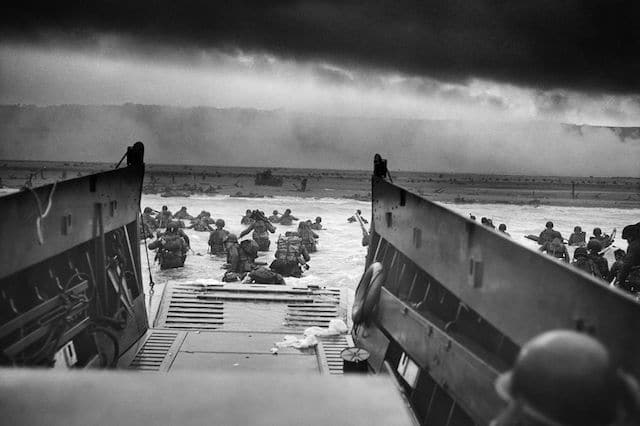
Another major event from World War II where weather played a crucial role was D-Day – June 6, 1944 – when the Allied forces landed in Normandy. The Germans were uncharacteristically lackadaisical when it came to the impending invasion. The man in charge, Field Marshall Edwin Rommel, wasn’t even there on D-Day. He was back in Germany, attending a birthday party.
It all came down to each side’s ability to forecast the weather. The Germans expected non-stop bad weather, which is why they thought there was no way that the Allies would invade anytime soon. As far as Rommel was concerned, he had a few free days and, as it happened, his wife’s 50th birthday was coming up. He had bought her a nice pair of shoes in Paris, so this was the perfect opportunity for him to go home and surprise her.
The Allies, however, had better forecasting technology and they knew that they had a 24-hour window when the weather would improve on June 6. They took advantage of the opportunity and caught the Germans unaware. Rommel was at his house in Germany when he was informed that the invasion had begun. By the time he reached Normandy, the Allies had already established their positions on all five landing positions.
1. A Missing Key Brings about the Sinking of the Titanic

Whenever a disaster happens, people naturally wonder if anything could have been done to prevent the tragedy. Undoubtedly, one of the most notorious disasters of all time is the sinking of the Titanic, so could anything have been done to save the doomed passenger ship? Perhaps, according to some scholars, who argue that one misplaced key could have sealed the Titanic’s fate.
That key belonged to the crow’s nest locker, where the binoculars were stored for the lookouts and was in the possession of a man named David Blair. Initially, Blair had been named Second Officer of the Titanic, responsible for all the navigation equipment. He was aboard the liner during its short voyage from Belfast, where it was built, to Southhampton, where it was due to depart on its maiden voyage. In Southhampton, however, he was replaced with a more experienced officer and, when he left the ship, he accidentally took the key with him.
With the crow’s nest locker locked, the lookouts relied on their naked eyes which, as we know by now, proved insufficient. Of course, we don’t know if, ultimately, the binoculars would have made the crucial difference, but at least one of the lookouts thought so and testified during the inquiry that with binoculars they would have spotted the iceberg in time to move out of the way.
2 Comments
“Ab sofort” means “immediately“. “Ab sofort an” means “from now on”.
The last one about Binoculars saving the Titanic actually has evidence against it. An experiment was conducted by the U.S. Coast Guard to see if binoculars would have helped the lookouts to see the iceberg sooner than they did, being done with similar weather conditions and moon phase, but they found it ineffective, largely due to the lack of moonlight to help them eyeball the iceberg sooner. It may have been nice to have them, but the benefits under the circumstances would have been negligible.